Managing Project: Characteristics, Stages, and Importance of Feasibility Study
VerifiedAdded on 2023/01/19
|15
|3834
|85
AI Summary
This report discusses the characteristics and stages of project management, the purpose of project initiation document, and the importance of feasibility study. It also explores the skills and competencies required by a project manager and the activities needed to successfully manage a project. The case of ABC company acquiring DEF in the retail sector is used as an example.
Contribute Materials
Your contribution can guide someone’s learning journey. Share your
documents today.
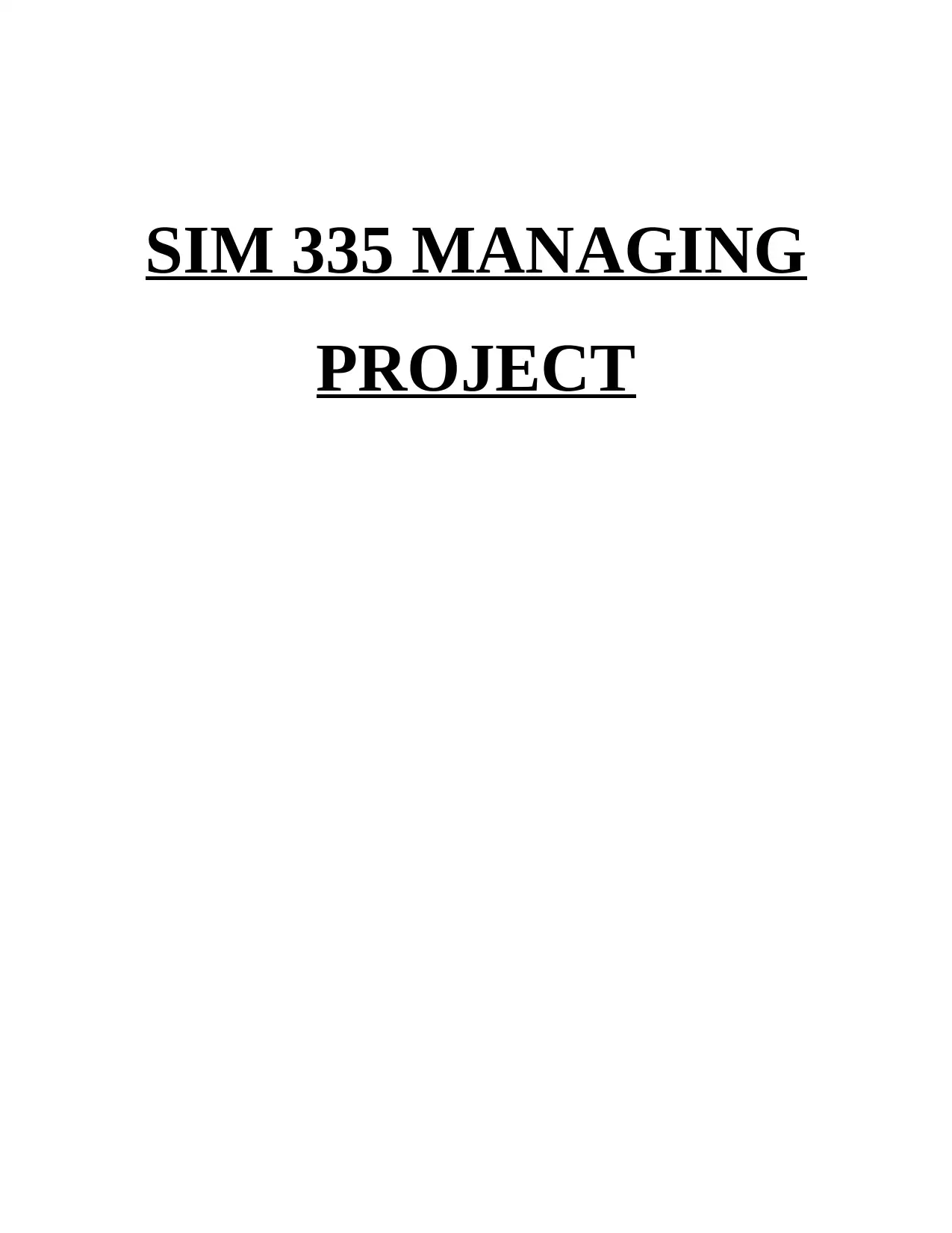
SIM 335 MANAGING
PROJECT
PROJECT
Secure Best Marks with AI Grader
Need help grading? Try our AI Grader for instant feedback on your assignments.
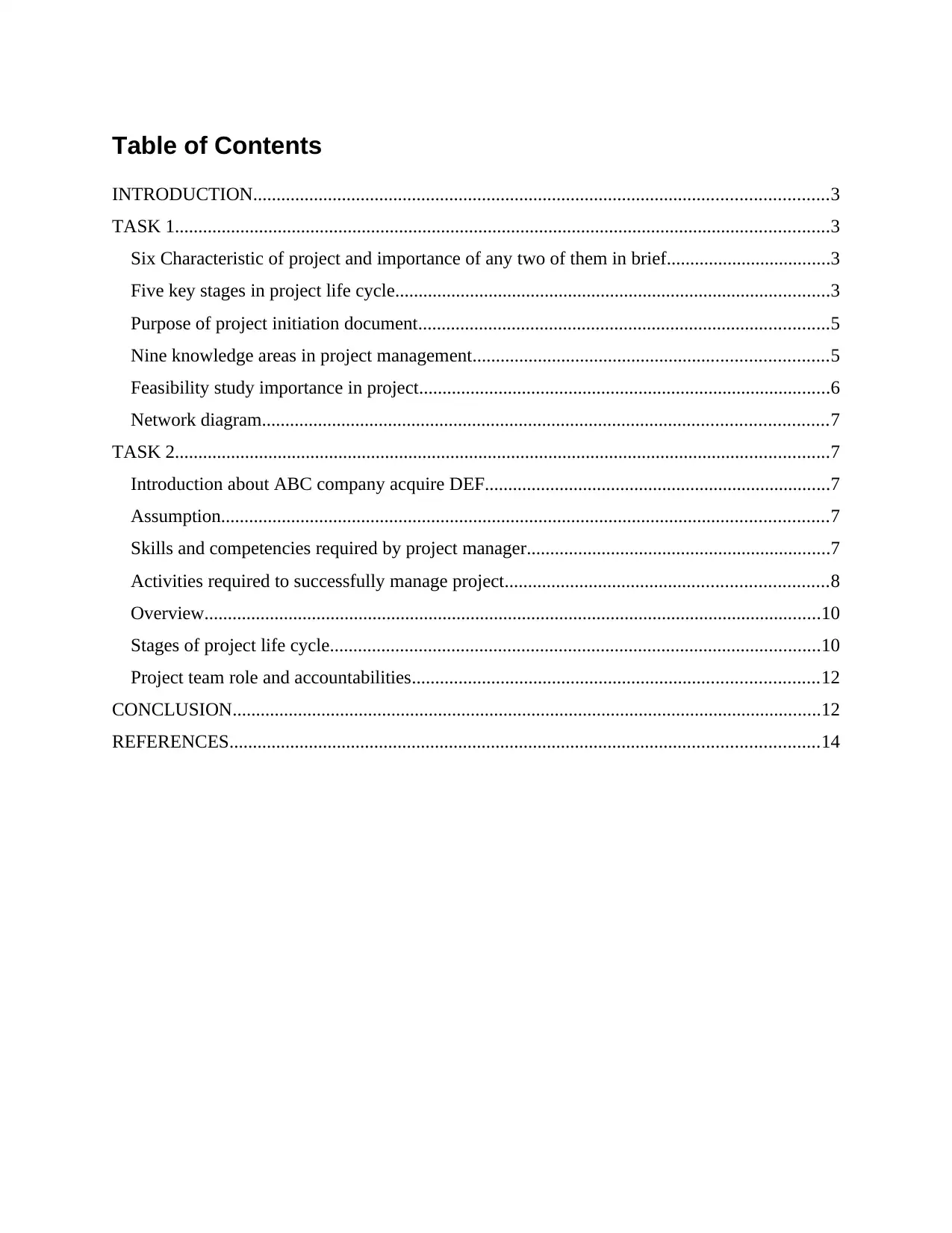
Table of Contents
INTRODUCTION...........................................................................................................................3
TASK 1............................................................................................................................................3
Six Characteristic of project and importance of any two of them in brief...................................3
Five key stages in project life cycle.............................................................................................3
Purpose of project initiation document........................................................................................5
Nine knowledge areas in project management............................................................................5
Feasibility study importance in project........................................................................................6
Network diagram.........................................................................................................................7
TASK 2............................................................................................................................................7
Introduction about ABC company acquire DEF..........................................................................7
Assumption..................................................................................................................................7
Skills and competencies required by project manager.................................................................7
Activities required to successfully manage project.....................................................................8
Overview....................................................................................................................................10
Stages of project life cycle.........................................................................................................10
Project team role and accountabilities.......................................................................................12
CONCLUSION..............................................................................................................................12
REFERENCES..............................................................................................................................14
INTRODUCTION...........................................................................................................................3
TASK 1............................................................................................................................................3
Six Characteristic of project and importance of any two of them in brief...................................3
Five key stages in project life cycle.............................................................................................3
Purpose of project initiation document........................................................................................5
Nine knowledge areas in project management............................................................................5
Feasibility study importance in project........................................................................................6
Network diagram.........................................................................................................................7
TASK 2............................................................................................................................................7
Introduction about ABC company acquire DEF..........................................................................7
Assumption..................................................................................................................................7
Skills and competencies required by project manager.................................................................7
Activities required to successfully manage project.....................................................................8
Overview....................................................................................................................................10
Stages of project life cycle.........................................................................................................10
Project team role and accountabilities.......................................................................................12
CONCLUSION..............................................................................................................................12
REFERENCES..............................................................................................................................14
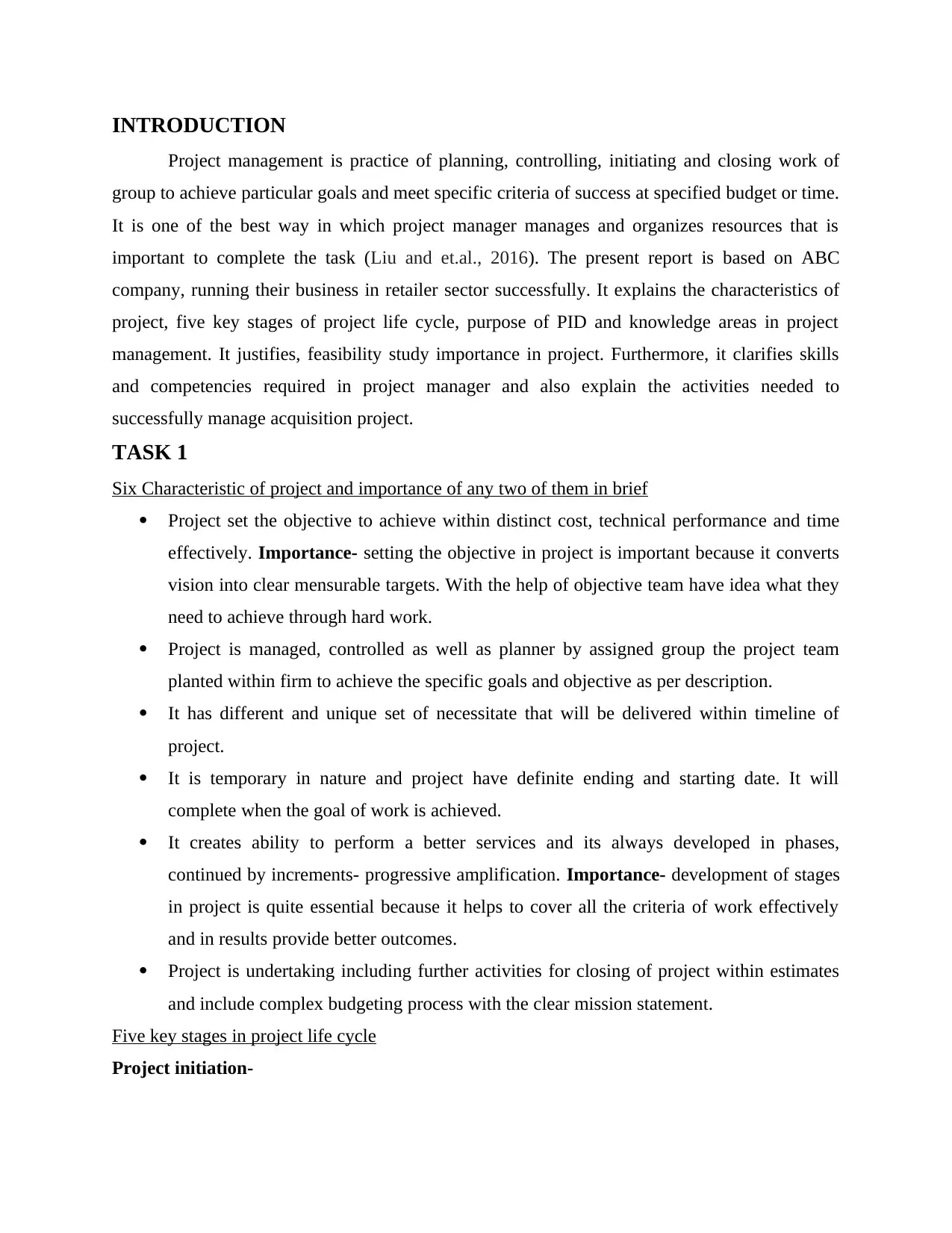
INTRODUCTION
Project management is practice of planning, controlling, initiating and closing work of
group to achieve particular goals and meet specific criteria of success at specified budget or time.
It is one of the best way in which project manager manages and organizes resources that is
important to complete the task (Liu and et.al., 2016). The present report is based on ABC
company, running their business in retailer sector successfully. It explains the characteristics of
project, five key stages of project life cycle, purpose of PID and knowledge areas in project
management. It justifies, feasibility study importance in project. Furthermore, it clarifies skills
and competencies required in project manager and also explain the activities needed to
successfully manage acquisition project.
TASK 1
Six Characteristic of project and importance of any two of them in brief
Project set the objective to achieve within distinct cost, technical performance and time
effectively. Importance- setting the objective in project is important because it converts
vision into clear mensurable targets. With the help of objective team have idea what they
need to achieve through hard work.
Project is managed, controlled as well as planner by assigned group the project team
planted within firm to achieve the specific goals and objective as per description.
It has different and unique set of necessitate that will be delivered within timeline of
project.
It is temporary in nature and project have definite ending and starting date. It will
complete when the goal of work is achieved.
It creates ability to perform a better services and its always developed in phases,
continued by increments- progressive amplification. Importance- development of stages
in project is quite essential because it helps to cover all the criteria of work effectively
and in results provide better outcomes.
Project is undertaking including further activities for closing of project within estimates
and include complex budgeting process with the clear mission statement.
Five key stages in project life cycle
Project initiation-
Project management is practice of planning, controlling, initiating and closing work of
group to achieve particular goals and meet specific criteria of success at specified budget or time.
It is one of the best way in which project manager manages and organizes resources that is
important to complete the task (Liu and et.al., 2016). The present report is based on ABC
company, running their business in retailer sector successfully. It explains the characteristics of
project, five key stages of project life cycle, purpose of PID and knowledge areas in project
management. It justifies, feasibility study importance in project. Furthermore, it clarifies skills
and competencies required in project manager and also explain the activities needed to
successfully manage acquisition project.
TASK 1
Six Characteristic of project and importance of any two of them in brief
Project set the objective to achieve within distinct cost, technical performance and time
effectively. Importance- setting the objective in project is important because it converts
vision into clear mensurable targets. With the help of objective team have idea what they
need to achieve through hard work.
Project is managed, controlled as well as planner by assigned group the project team
planted within firm to achieve the specific goals and objective as per description.
It has different and unique set of necessitate that will be delivered within timeline of
project.
It is temporary in nature and project have definite ending and starting date. It will
complete when the goal of work is achieved.
It creates ability to perform a better services and its always developed in phases,
continued by increments- progressive amplification. Importance- development of stages
in project is quite essential because it helps to cover all the criteria of work effectively
and in results provide better outcomes.
Project is undertaking including further activities for closing of project within estimates
and include complex budgeting process with the clear mission statement.
Five key stages in project life cycle
Project initiation-
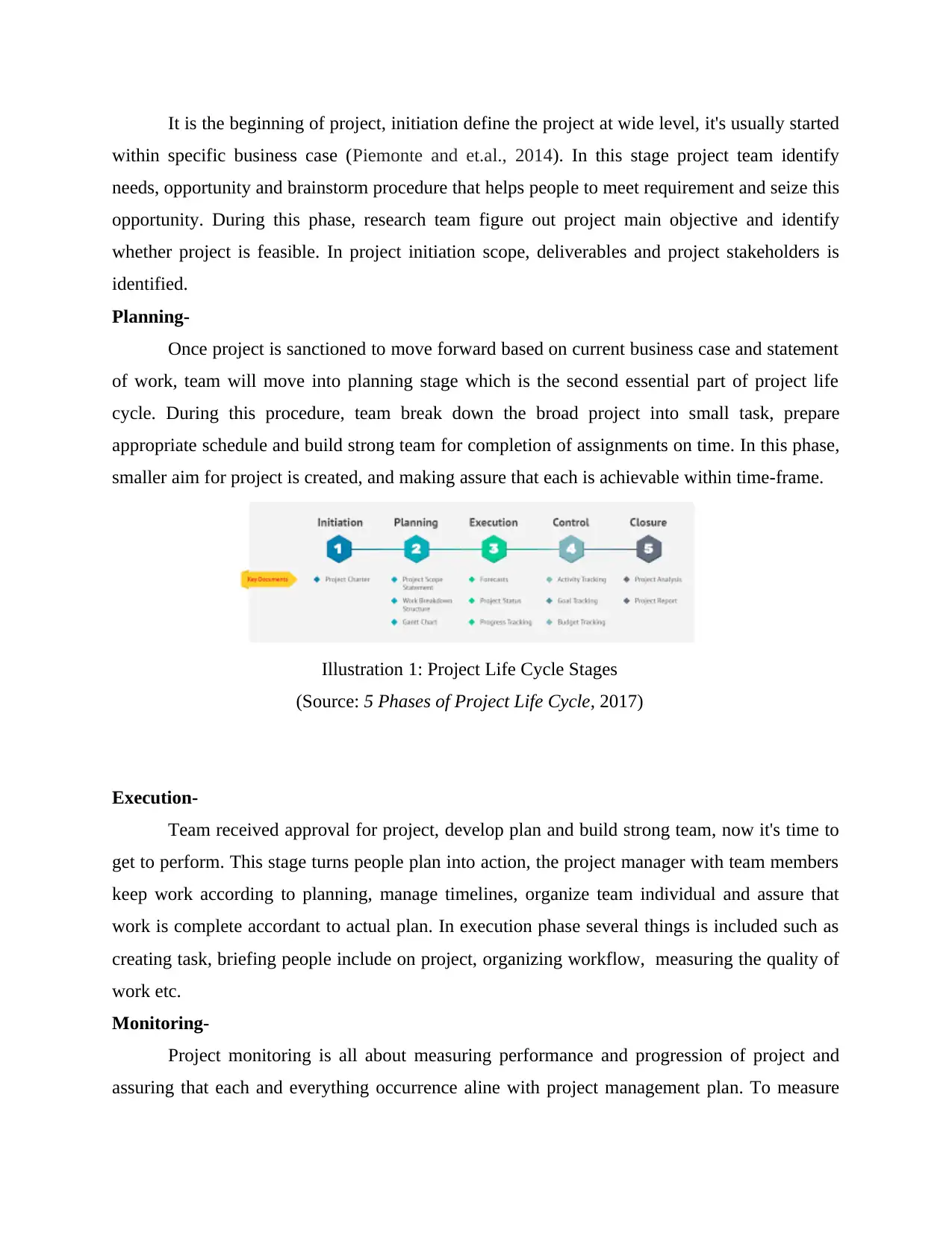
It is the beginning of project, initiation define the project at wide level, it's usually started
within specific business case (Piemonte and et.al., 2014). In this stage project team identify
needs, opportunity and brainstorm procedure that helps people to meet requirement and seize this
opportunity. During this phase, research team figure out project main objective and identify
whether project is feasible. In project initiation scope, deliverables and project stakeholders is
identified.
Planning-
Once project is sanctioned to move forward based on current business case and statement
of work, team will move into planning stage which is the second essential part of project life
cycle. During this procedure, team break down the broad project into small task, prepare
appropriate schedule and build strong team for completion of assignments on time. In this phase,
smaller aim for project is created, and making assure that each is achievable within time-frame.
Execution-
Team received approval for project, develop plan and build strong team, now it's time to
get to perform. This stage turns people plan into action, the project manager with team members
keep work according to planning, manage timelines, organize team individual and assure that
work is complete accordant to actual plan. In execution phase several things is included such as
creating task, briefing people include on project, organizing workflow, measuring the quality of
work etc.
Monitoring-
Project monitoring is all about measuring performance and progression of project and
assuring that each and everything occurrence aline with project management plan. To measure
Illustration 1: Project Life Cycle Stages
(Source: 5 Phases of Project Life Cycle, 2017)
within specific business case (Piemonte and et.al., 2014). In this stage project team identify
needs, opportunity and brainstorm procedure that helps people to meet requirement and seize this
opportunity. During this phase, research team figure out project main objective and identify
whether project is feasible. In project initiation scope, deliverables and project stakeholders is
identified.
Planning-
Once project is sanctioned to move forward based on current business case and statement
of work, team will move into planning stage which is the second essential part of project life
cycle. During this procedure, team break down the broad project into small task, prepare
appropriate schedule and build strong team for completion of assignments on time. In this phase,
smaller aim for project is created, and making assure that each is achievable within time-frame.
Execution-
Team received approval for project, develop plan and build strong team, now it's time to
get to perform. This stage turns people plan into action, the project manager with team members
keep work according to planning, manage timelines, organize team individual and assure that
work is complete accordant to actual plan. In execution phase several things is included such as
creating task, briefing people include on project, organizing workflow, measuring the quality of
work etc.
Monitoring-
Project monitoring is all about measuring performance and progression of project and
assuring that each and everything occurrence aline with project management plan. To measure
Illustration 1: Project Life Cycle Stages
(Source: 5 Phases of Project Life Cycle, 2017)
Secure Best Marks with AI Grader
Need help grading? Try our AI Grader for instant feedback on your assignments.
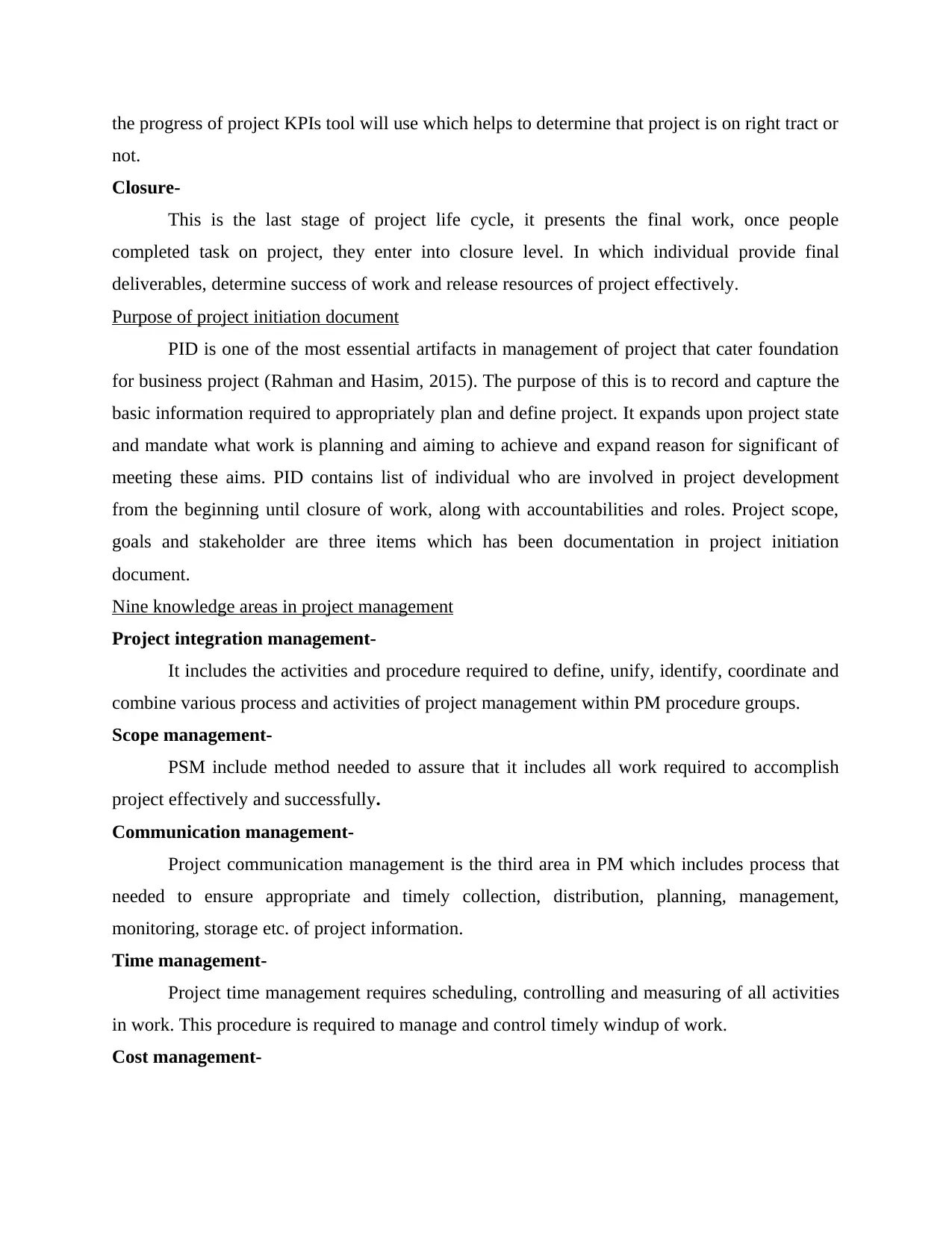
the progress of project KPIs tool will use which helps to determine that project is on right tract or
not.
Closure-
This is the last stage of project life cycle, it presents the final work, once people
completed task on project, they enter into closure level. In which individual provide final
deliverables, determine success of work and release resources of project effectively.
Purpose of project initiation document
PID is one of the most essential artifacts in management of project that cater foundation
for business project (Rahman and Hasim, 2015). The purpose of this is to record and capture the
basic information required to appropriately plan and define project. It expands upon project state
and mandate what work is planning and aiming to achieve and expand reason for significant of
meeting these aims. PID contains list of individual who are involved in project development
from the beginning until closure of work, along with accountabilities and roles. Project scope,
goals and stakeholder are three items which has been documentation in project initiation
document.
Nine knowledge areas in project management
Project integration management-
It includes the activities and procedure required to define, unify, identify, coordinate and
combine various process and activities of project management within PM procedure groups.
Scope management-
PSM include method needed to assure that it includes all work required to accomplish
project effectively and successfully.
Communication management-
Project communication management is the third area in PM which includes process that
needed to ensure appropriate and timely collection, distribution, planning, management,
monitoring, storage etc. of project information.
Time management-
Project time management requires scheduling, controlling and measuring of all activities
in work. This procedure is required to manage and control timely windup of work.
Cost management-
not.
Closure-
This is the last stage of project life cycle, it presents the final work, once people
completed task on project, they enter into closure level. In which individual provide final
deliverables, determine success of work and release resources of project effectively.
Purpose of project initiation document
PID is one of the most essential artifacts in management of project that cater foundation
for business project (Rahman and Hasim, 2015). The purpose of this is to record and capture the
basic information required to appropriately plan and define project. It expands upon project state
and mandate what work is planning and aiming to achieve and expand reason for significant of
meeting these aims. PID contains list of individual who are involved in project development
from the beginning until closure of work, along with accountabilities and roles. Project scope,
goals and stakeholder are three items which has been documentation in project initiation
document.
Nine knowledge areas in project management
Project integration management-
It includes the activities and procedure required to define, unify, identify, coordinate and
combine various process and activities of project management within PM procedure groups.
Scope management-
PSM include method needed to assure that it includes all work required to accomplish
project effectively and successfully.
Communication management-
Project communication management is the third area in PM which includes process that
needed to ensure appropriate and timely collection, distribution, planning, management,
monitoring, storage etc. of project information.
Time management-
Project time management requires scheduling, controlling and measuring of all activities
in work. This procedure is required to manage and control timely windup of work.
Cost management-
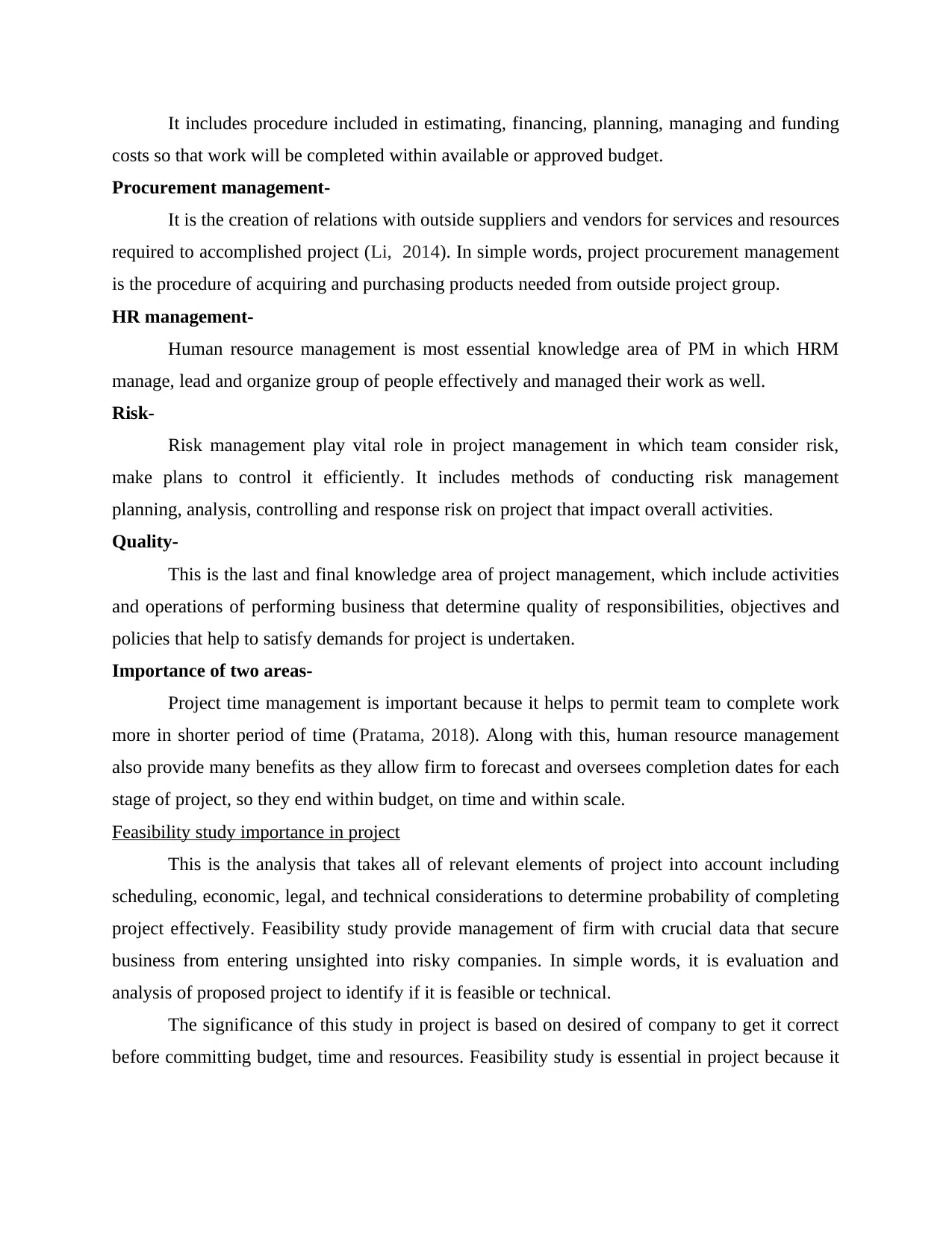
It includes procedure included in estimating, financing, planning, managing and funding
costs so that work will be completed within available or approved budget.
Procurement management-
It is the creation of relations with outside suppliers and vendors for services and resources
required to accomplished project (Li, 2014). In simple words, project procurement management
is the procedure of acquiring and purchasing products needed from outside project group.
HR management-
Human resource management is most essential knowledge area of PM in which HRM
manage, lead and organize group of people effectively and managed their work as well.
Risk-
Risk management play vital role in project management in which team consider risk,
make plans to control it efficiently. It includes methods of conducting risk management
planning, analysis, controlling and response risk on project that impact overall activities.
Quality-
This is the last and final knowledge area of project management, which include activities
and operations of performing business that determine quality of responsibilities, objectives and
policies that help to satisfy demands for project is undertaken.
Importance of two areas-
Project time management is important because it helps to permit team to complete work
more in shorter period of time (Pratama, 2018). Along with this, human resource management
also provide many benefits as they allow firm to forecast and oversees completion dates for each
stage of project, so they end within budget, on time and within scale.
Feasibility study importance in project
This is the analysis that takes all of relevant elements of project into account including
scheduling, economic, legal, and technical considerations to determine probability of completing
project effectively. Feasibility study provide management of firm with crucial data that secure
business from entering unsighted into risky companies. In simple words, it is evaluation and
analysis of proposed project to identify if it is feasible or technical.
The significance of this study in project is based on desired of company to get it correct
before committing budget, time and resources. Feasibility study is essential in project because it
costs so that work will be completed within available or approved budget.
Procurement management-
It is the creation of relations with outside suppliers and vendors for services and resources
required to accomplished project (Li, 2014). In simple words, project procurement management
is the procedure of acquiring and purchasing products needed from outside project group.
HR management-
Human resource management is most essential knowledge area of PM in which HRM
manage, lead and organize group of people effectively and managed their work as well.
Risk-
Risk management play vital role in project management in which team consider risk,
make plans to control it efficiently. It includes methods of conducting risk management
planning, analysis, controlling and response risk on project that impact overall activities.
Quality-
This is the last and final knowledge area of project management, which include activities
and operations of performing business that determine quality of responsibilities, objectives and
policies that help to satisfy demands for project is undertaken.
Importance of two areas-
Project time management is important because it helps to permit team to complete work
more in shorter period of time (Pratama, 2018). Along with this, human resource management
also provide many benefits as they allow firm to forecast and oversees completion dates for each
stage of project, so they end within budget, on time and within scale.
Feasibility study importance in project
This is the analysis that takes all of relevant elements of project into account including
scheduling, economic, legal, and technical considerations to determine probability of completing
project effectively. Feasibility study provide management of firm with crucial data that secure
business from entering unsighted into risky companies. In simple words, it is evaluation and
analysis of proposed project to identify if it is feasible or technical.
The significance of this study in project is based on desired of company to get it correct
before committing budget, time and resources. Feasibility study is essential in project because it
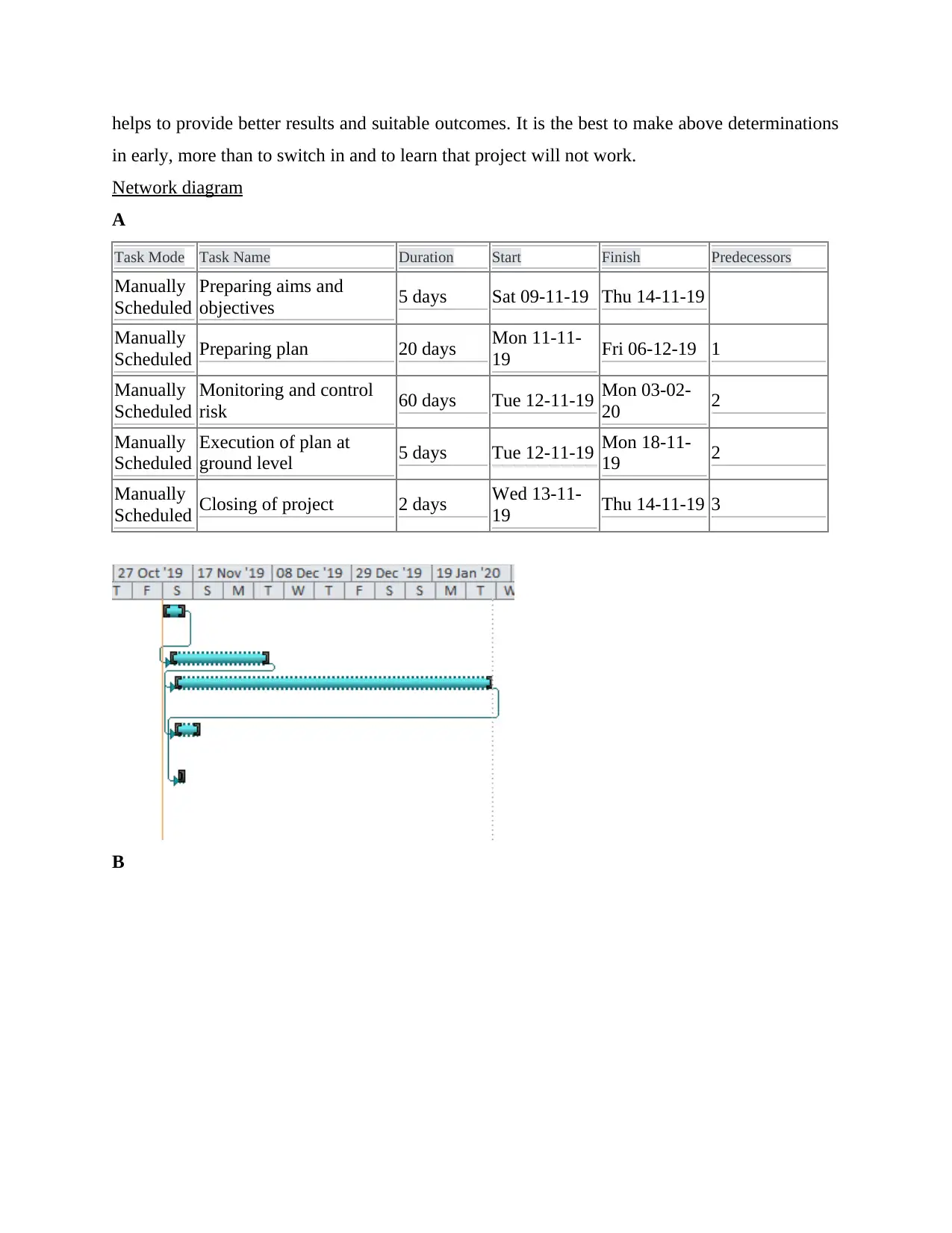
helps to provide better results and suitable outcomes. It is the best to make above determinations
in early, more than to switch in and to learn that project will not work.
Network diagram
A
Task Mode Task Name Duration Start Finish Predecessors
Manually
Scheduled
Preparing aims and
objectives 5 days Sat 09-11-19 Thu 14-11-19
Manually
Scheduled Preparing plan 20 days Mon 11-11-
19 Fri 06-12-19 1
Manually
Scheduled
Monitoring and control
risk 60 days Tue 12-11-19 Mon 03-02-
20 2
Manually
Scheduled
Execution of plan at
ground level 5 days Tue 12-11-19 Mon 18-11-
19 2
Manually
Scheduled Closing of project 2 days Wed 13-11-
19 Thu 14-11-19 3
B
in early, more than to switch in and to learn that project will not work.
Network diagram
A
Task Mode Task Name Duration Start Finish Predecessors
Manually
Scheduled
Preparing aims and
objectives 5 days Sat 09-11-19 Thu 14-11-19
Manually
Scheduled Preparing plan 20 days Mon 11-11-
19 Fri 06-12-19 1
Manually
Scheduled
Monitoring and control
risk 60 days Tue 12-11-19 Mon 03-02-
20 2
Manually
Scheduled
Execution of plan at
ground level 5 days Tue 12-11-19 Mon 18-11-
19 2
Manually
Scheduled Closing of project 2 days Wed 13-11-
19 Thu 14-11-19 3
B
Paraphrase This Document
Need a fresh take? Get an instant paraphrase of this document with our AI Paraphraser
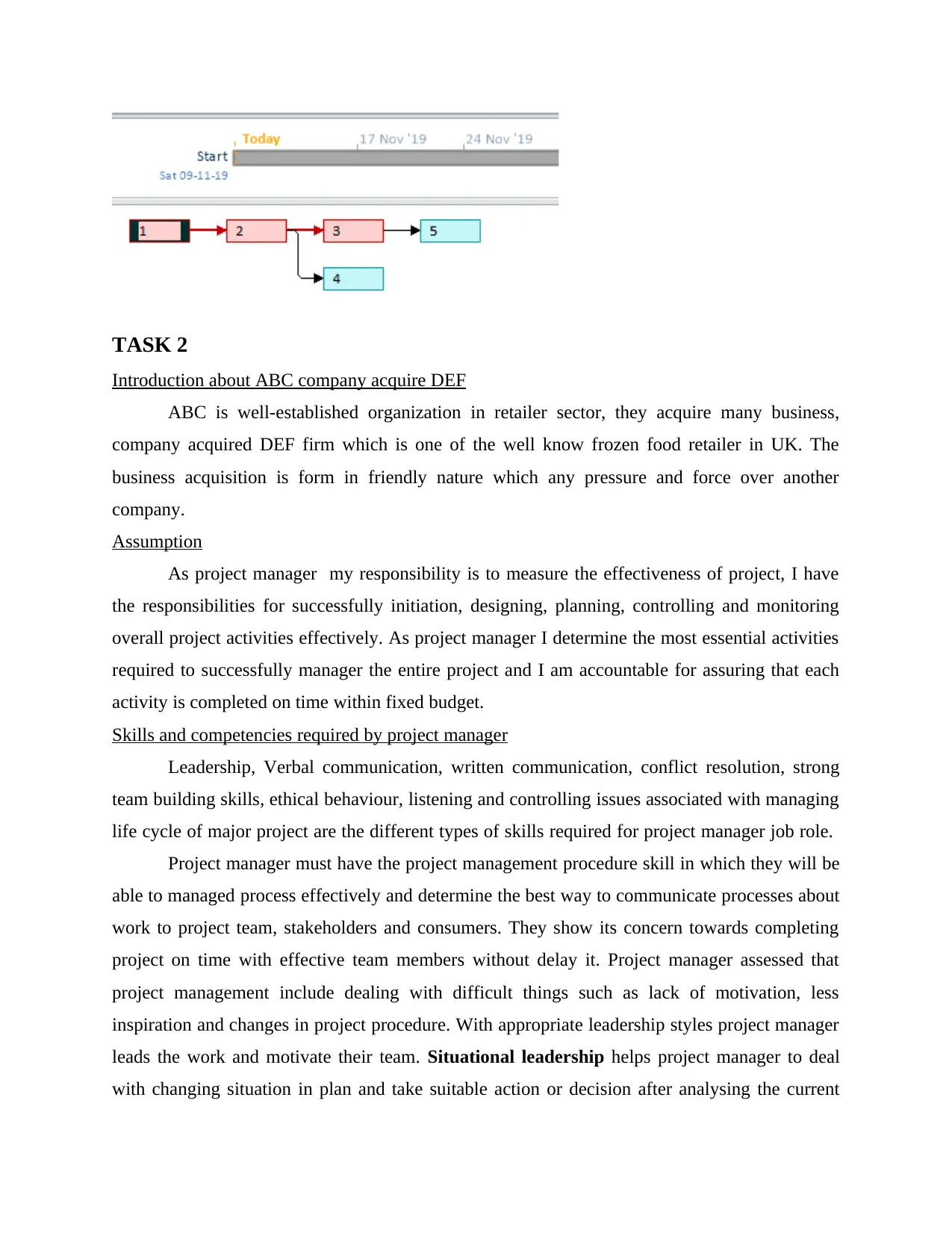
TASK 2
Introduction about ABC company acquire DEF
ABC is well-established organization in retailer sector, they acquire many business,
company acquired DEF firm which is one of the well know frozen food retailer in UK. The
business acquisition is form in friendly nature which any pressure and force over another
company.
Assumption
As project manager my responsibility is to measure the effectiveness of project, I have
the responsibilities for successfully initiation, designing, planning, controlling and monitoring
overall project activities effectively. As project manager I determine the most essential activities
required to successfully manager the entire project and I am accountable for assuring that each
activity is completed on time within fixed budget.
Skills and competencies required by project manager
Leadership, Verbal communication, written communication, conflict resolution, strong
team building skills, ethical behaviour, listening and controlling issues associated with managing
life cycle of major project are the different types of skills required for project manager job role.
Project manager must have the project management procedure skill in which they will be
able to managed process effectively and determine the best way to communicate processes about
work to project team, stakeholders and consumers. They show its concern towards completing
project on time with effective team members without delay it. Project manager assessed that
project management include dealing with difficult things such as lack of motivation, less
inspiration and changes in project procedure. With appropriate leadership styles project manager
leads the work and motivate their team. Situational leadership helps project manager to deal
with changing situation in plan and take suitable action or decision after analysing the current
Introduction about ABC company acquire DEF
ABC is well-established organization in retailer sector, they acquire many business,
company acquired DEF firm which is one of the well know frozen food retailer in UK. The
business acquisition is form in friendly nature which any pressure and force over another
company.
Assumption
As project manager my responsibility is to measure the effectiveness of project, I have
the responsibilities for successfully initiation, designing, planning, controlling and monitoring
overall project activities effectively. As project manager I determine the most essential activities
required to successfully manager the entire project and I am accountable for assuring that each
activity is completed on time within fixed budget.
Skills and competencies required by project manager
Leadership, Verbal communication, written communication, conflict resolution, strong
team building skills, ethical behaviour, listening and controlling issues associated with managing
life cycle of major project are the different types of skills required for project manager job role.
Project manager must have the project management procedure skill in which they will be
able to managed process effectively and determine the best way to communicate processes about
work to project team, stakeholders and consumers. They show its concern towards completing
project on time with effective team members without delay it. Project manager assessed that
project management include dealing with difficult things such as lack of motivation, less
inspiration and changes in project procedure. With appropriate leadership styles project manager
leads the work and motivate their team. Situational leadership helps project manager to deal
with changing situation in plan and take suitable action or decision after analysing the current
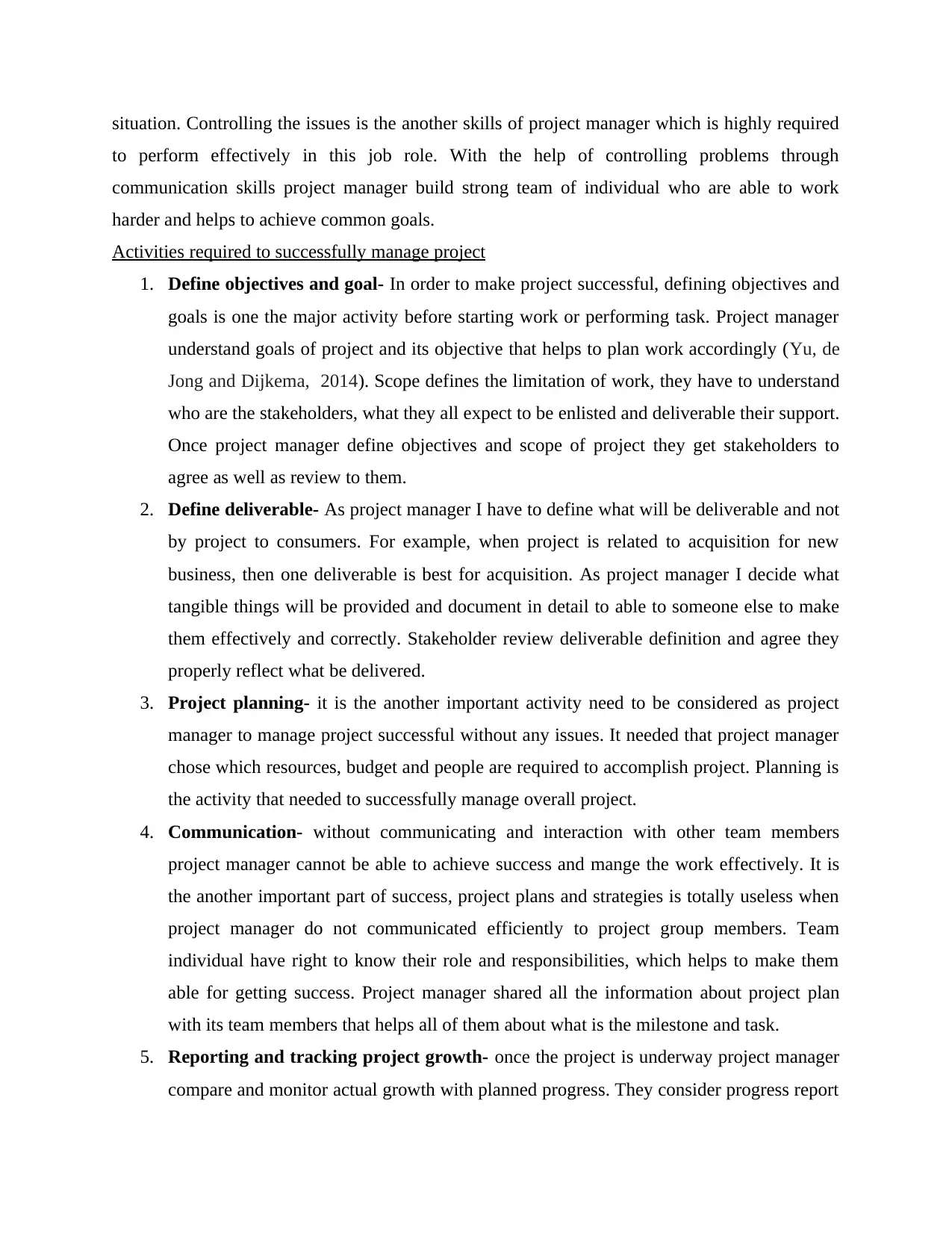
situation. Controlling the issues is the another skills of project manager which is highly required
to perform effectively in this job role. With the help of controlling problems through
communication skills project manager build strong team of individual who are able to work
harder and helps to achieve common goals.
Activities required to successfully manage project
1. Define objectives and goal- In order to make project successful, defining objectives and
goals is one the major activity before starting work or performing task. Project manager
understand goals of project and its objective that helps to plan work accordingly (Yu, de
Jong and Dijkema, 2014). Scope defines the limitation of work, they have to understand
who are the stakeholders, what they all expect to be enlisted and deliverable their support.
Once project manager define objectives and scope of project they get stakeholders to
agree as well as review to them.
2. Define deliverable- As project manager I have to define what will be deliverable and not
by project to consumers. For example, when project is related to acquisition for new
business, then one deliverable is best for acquisition. As project manager I decide what
tangible things will be provided and document in detail to able to someone else to make
them effectively and correctly. Stakeholder review deliverable definition and agree they
properly reflect what be delivered.
3. Project planning- it is the another important activity need to be considered as project
manager to manage project successful without any issues. It needed that project manager
chose which resources, budget and people are required to accomplish project. Planning is
the activity that needed to successfully manage overall project.
4. Communication- without communicating and interaction with other team members
project manager cannot be able to achieve success and mange the work effectively. It is
the another important part of success, project plans and strategies is totally useless when
project manager do not communicated efficiently to project group members. Team
individual have right to know their role and responsibilities, which helps to make them
able for getting success. Project manager shared all the information about project plan
with its team members that helps all of them about what is the milestone and task.
5. Reporting and tracking project growth- once the project is underway project manager
compare and monitor actual growth with planned progress. They consider progress report
to perform effectively in this job role. With the help of controlling problems through
communication skills project manager build strong team of individual who are able to work
harder and helps to achieve common goals.
Activities required to successfully manage project
1. Define objectives and goal- In order to make project successful, defining objectives and
goals is one the major activity before starting work or performing task. Project manager
understand goals of project and its objective that helps to plan work accordingly (Yu, de
Jong and Dijkema, 2014). Scope defines the limitation of work, they have to understand
who are the stakeholders, what they all expect to be enlisted and deliverable their support.
Once project manager define objectives and scope of project they get stakeholders to
agree as well as review to them.
2. Define deliverable- As project manager I have to define what will be deliverable and not
by project to consumers. For example, when project is related to acquisition for new
business, then one deliverable is best for acquisition. As project manager I decide what
tangible things will be provided and document in detail to able to someone else to make
them effectively and correctly. Stakeholder review deliverable definition and agree they
properly reflect what be delivered.
3. Project planning- it is the another important activity need to be considered as project
manager to manage project successful without any issues. It needed that project manager
chose which resources, budget and people are required to accomplish project. Planning is
the activity that needed to successfully manage overall project.
4. Communication- without communicating and interaction with other team members
project manager cannot be able to achieve success and mange the work effectively. It is
the another important part of success, project plans and strategies is totally useless when
project manager do not communicated efficiently to project group members. Team
individual have right to know their role and responsibilities, which helps to make them
able for getting success. Project manager shared all the information about project plan
with its team members that helps all of them about what is the milestone and task.
5. Reporting and tracking project growth- once the project is underway project manager
compare and monitor actual growth with planned progress. They consider progress report
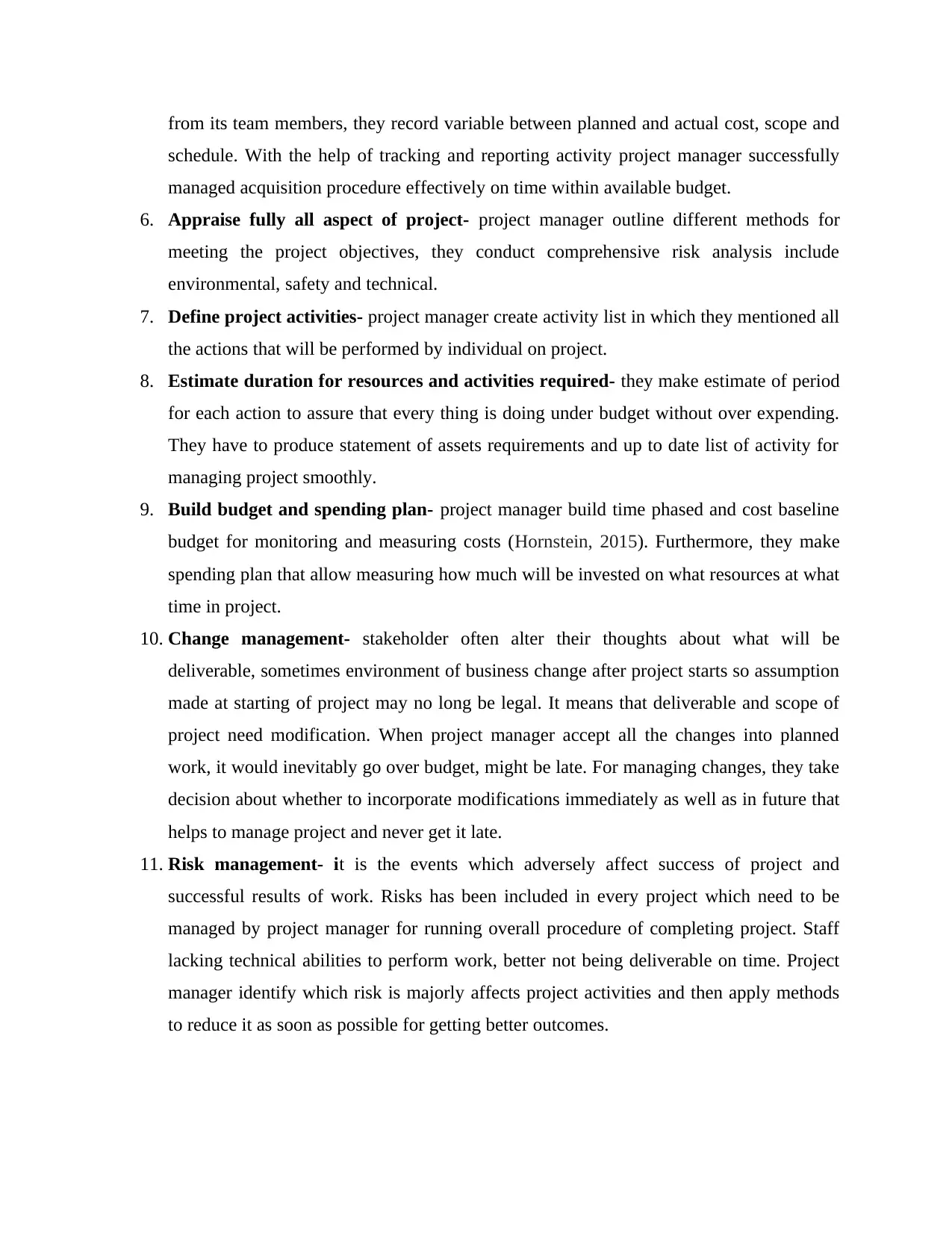
from its team members, they record variable between planned and actual cost, scope and
schedule. With the help of tracking and reporting activity project manager successfully
managed acquisition procedure effectively on time within available budget.
6. Appraise fully all aspect of project- project manager outline different methods for
meeting the project objectives, they conduct comprehensive risk analysis include
environmental, safety and technical.
7. Define project activities- project manager create activity list in which they mentioned all
the actions that will be performed by individual on project.
8. Estimate duration for resources and activities required- they make estimate of period
for each action to assure that every thing is doing under budget without over expending.
They have to produce statement of assets requirements and up to date list of activity for
managing project smoothly.
9. Build budget and spending plan- project manager build time phased and cost baseline
budget for monitoring and measuring costs (Hornstein, 2015). Furthermore, they make
spending plan that allow measuring how much will be invested on what resources at what
time in project.
10. Change management- stakeholder often alter their thoughts about what will be
deliverable, sometimes environment of business change after project starts so assumption
made at starting of project may no long be legal. It means that deliverable and scope of
project need modification. When project manager accept all the changes into planned
work, it would inevitably go over budget, might be late. For managing changes, they take
decision about whether to incorporate modifications immediately as well as in future that
helps to manage project and never get it late.
11. Risk management- it is the events which adversely affect success of project and
successful results of work. Risks has been included in every project which need to be
managed by project manager for running overall procedure of completing project. Staff
lacking technical abilities to perform work, better not being deliverable on time. Project
manager identify which risk is majorly affects project activities and then apply methods
to reduce it as soon as possible for getting better outcomes.
schedule. With the help of tracking and reporting activity project manager successfully
managed acquisition procedure effectively on time within available budget.
6. Appraise fully all aspect of project- project manager outline different methods for
meeting the project objectives, they conduct comprehensive risk analysis include
environmental, safety and technical.
7. Define project activities- project manager create activity list in which they mentioned all
the actions that will be performed by individual on project.
8. Estimate duration for resources and activities required- they make estimate of period
for each action to assure that every thing is doing under budget without over expending.
They have to produce statement of assets requirements and up to date list of activity for
managing project smoothly.
9. Build budget and spending plan- project manager build time phased and cost baseline
budget for monitoring and measuring costs (Hornstein, 2015). Furthermore, they make
spending plan that allow measuring how much will be invested on what resources at what
time in project.
10. Change management- stakeholder often alter their thoughts about what will be
deliverable, sometimes environment of business change after project starts so assumption
made at starting of project may no long be legal. It means that deliverable and scope of
project need modification. When project manager accept all the changes into planned
work, it would inevitably go over budget, might be late. For managing changes, they take
decision about whether to incorporate modifications immediately as well as in future that
helps to manage project and never get it late.
11. Risk management- it is the events which adversely affect success of project and
successful results of work. Risks has been included in every project which need to be
managed by project manager for running overall procedure of completing project. Staff
lacking technical abilities to perform work, better not being deliverable on time. Project
manager identify which risk is majorly affects project activities and then apply methods
to reduce it as soon as possible for getting better outcomes.
Secure Best Marks with AI Grader
Need help grading? Try our AI Grader for instant feedback on your assignments.
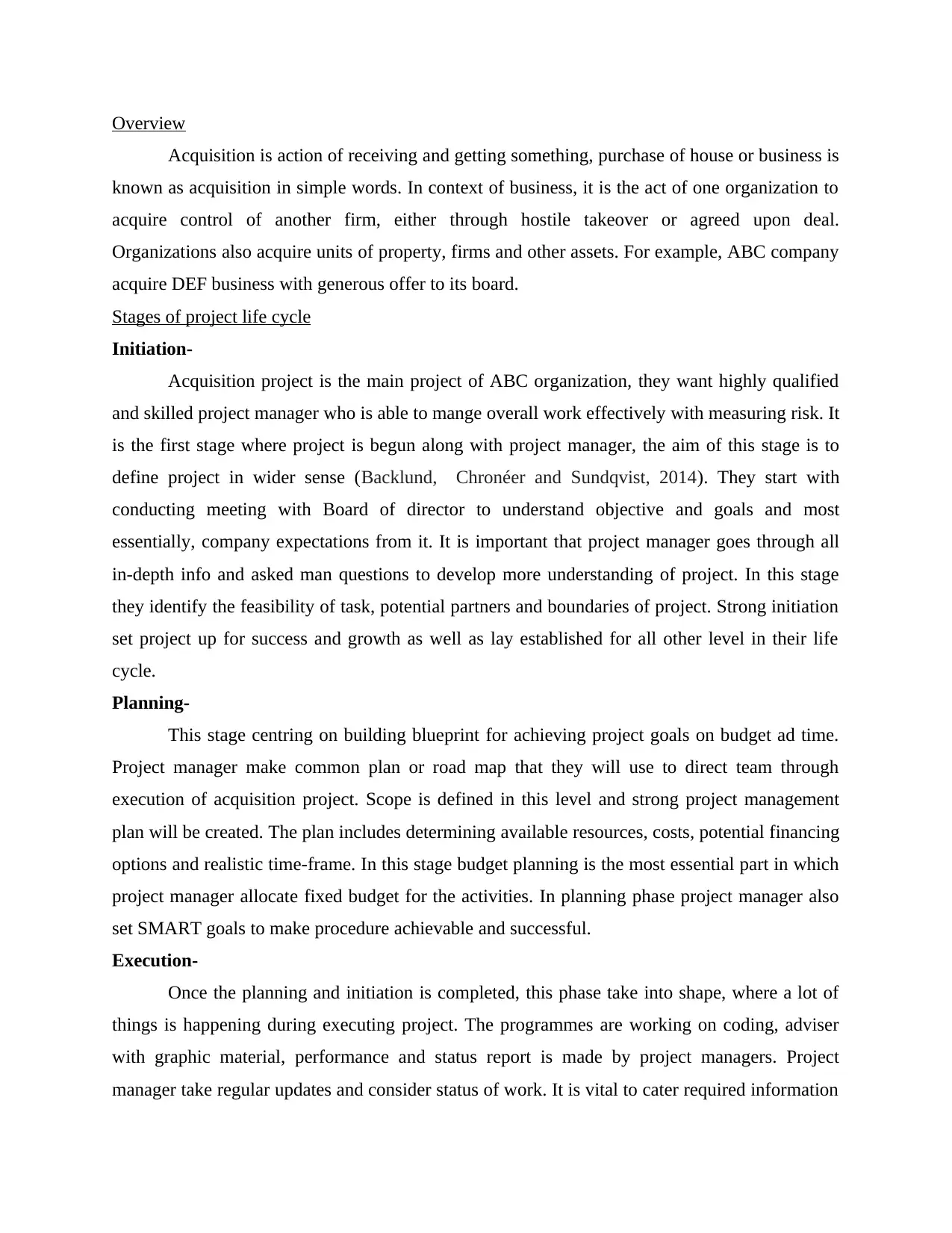
Overview
Acquisition is action of receiving and getting something, purchase of house or business is
known as acquisition in simple words. In context of business, it is the act of one organization to
acquire control of another firm, either through hostile takeover or agreed upon deal.
Organizations also acquire units of property, firms and other assets. For example, ABC company
acquire DEF business with generous offer to its board.
Stages of project life cycle
Initiation-
Acquisition project is the main project of ABC organization, they want highly qualified
and skilled project manager who is able to mange overall work effectively with measuring risk. It
is the first stage where project is begun along with project manager, the aim of this stage is to
define project in wider sense (Backlund, Chronéer and Sundqvist, 2014). They start with
conducting meeting with Board of director to understand objective and goals and most
essentially, company expectations from it. It is important that project manager goes through all
in-depth info and asked man questions to develop more understanding of project. In this stage
they identify the feasibility of task, potential partners and boundaries of project. Strong initiation
set project up for success and growth as well as lay established for all other level in their life
cycle.
Planning-
This stage centring on building blueprint for achieving project goals on budget ad time.
Project manager make common plan or road map that they will use to direct team through
execution of acquisition project. Scope is defined in this level and strong project management
plan will be created. The plan includes determining available resources, costs, potential financing
options and realistic time-frame. In this stage budget planning is the most essential part in which
project manager allocate fixed budget for the activities. In planning phase project manager also
set SMART goals to make procedure achievable and successful.
Execution-
Once the planning and initiation is completed, this phase take into shape, where a lot of
things is happening during executing project. The programmes are working on coding, adviser
with graphic material, performance and status report is made by project managers. Project
manager take regular updates and consider status of work. It is vital to cater required information
Acquisition is action of receiving and getting something, purchase of house or business is
known as acquisition in simple words. In context of business, it is the act of one organization to
acquire control of another firm, either through hostile takeover or agreed upon deal.
Organizations also acquire units of property, firms and other assets. For example, ABC company
acquire DEF business with generous offer to its board.
Stages of project life cycle
Initiation-
Acquisition project is the main project of ABC organization, they want highly qualified
and skilled project manager who is able to mange overall work effectively with measuring risk. It
is the first stage where project is begun along with project manager, the aim of this stage is to
define project in wider sense (Backlund, Chronéer and Sundqvist, 2014). They start with
conducting meeting with Board of director to understand objective and goals and most
essentially, company expectations from it. It is important that project manager goes through all
in-depth info and asked man questions to develop more understanding of project. In this stage
they identify the feasibility of task, potential partners and boundaries of project. Strong initiation
set project up for success and growth as well as lay established for all other level in their life
cycle.
Planning-
This stage centring on building blueprint for achieving project goals on budget ad time.
Project manager make common plan or road map that they will use to direct team through
execution of acquisition project. Scope is defined in this level and strong project management
plan will be created. The plan includes determining available resources, costs, potential financing
options and realistic time-frame. In this stage budget planning is the most essential part in which
project manager allocate fixed budget for the activities. In planning phase project manager also
set SMART goals to make procedure achievable and successful.
Execution-
Once the planning and initiation is completed, this phase take into shape, where a lot of
things is happening during executing project. The programmes are working on coding, adviser
with graphic material, performance and status report is made by project managers. Project
manager take regular updates and consider status of work. It is vital to cater required information
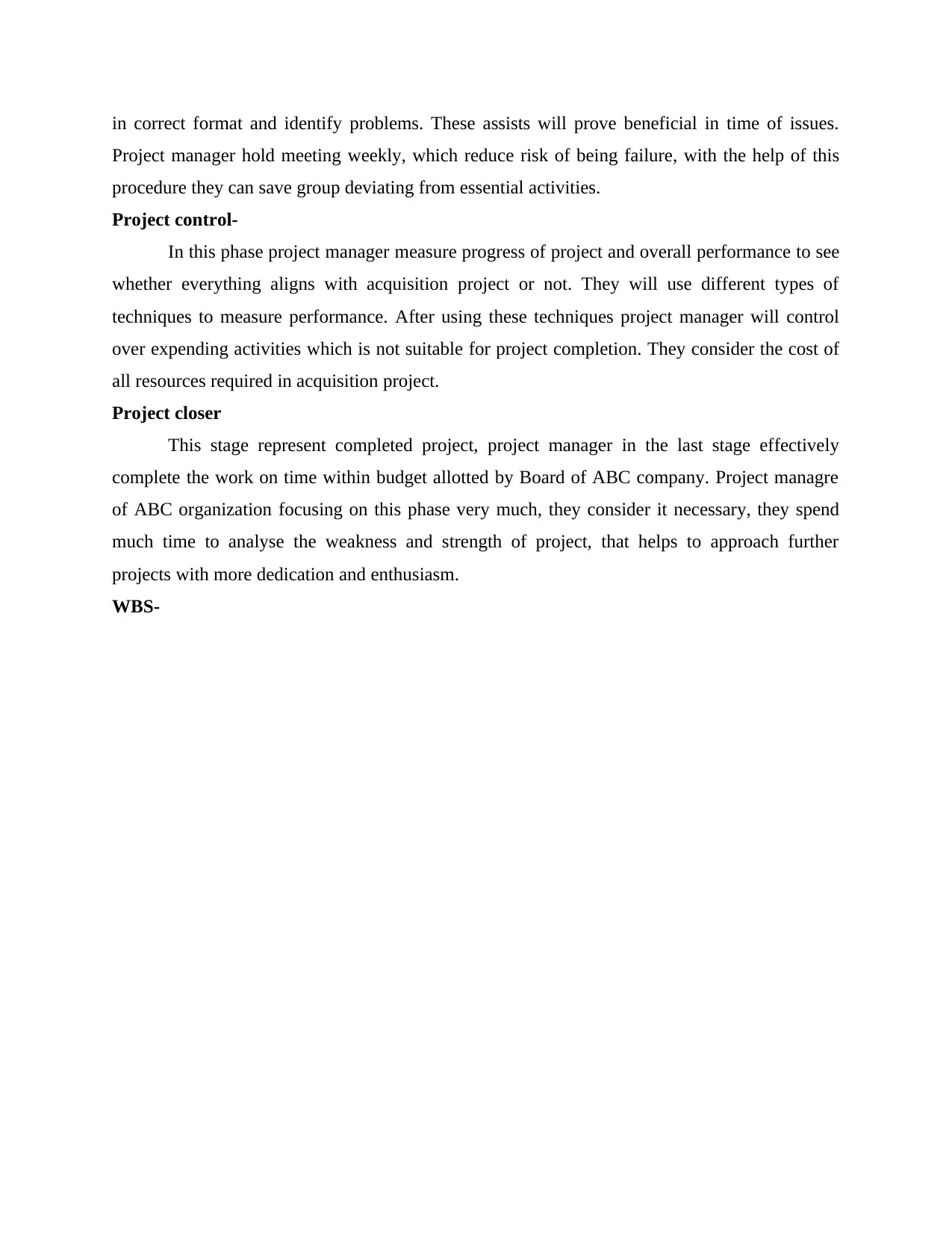
in correct format and identify problems. These assists will prove beneficial in time of issues.
Project manager hold meeting weekly, which reduce risk of being failure, with the help of this
procedure they can save group deviating from essential activities.
Project control-
In this phase project manager measure progress of project and overall performance to see
whether everything aligns with acquisition project or not. They will use different types of
techniques to measure performance. After using these techniques project manager will control
over expending activities which is not suitable for project completion. They consider the cost of
all resources required in acquisition project.
Project closer
This stage represent completed project, project manager in the last stage effectively
complete the work on time within budget allotted by Board of ABC company. Project managre
of ABC organization focusing on this phase very much, they consider it necessary, they spend
much time to analyse the weakness and strength of project, that helps to approach further
projects with more dedication and enthusiasm.
WBS-
Project manager hold meeting weekly, which reduce risk of being failure, with the help of this
procedure they can save group deviating from essential activities.
Project control-
In this phase project manager measure progress of project and overall performance to see
whether everything aligns with acquisition project or not. They will use different types of
techniques to measure performance. After using these techniques project manager will control
over expending activities which is not suitable for project completion. They consider the cost of
all resources required in acquisition project.
Project closer
This stage represent completed project, project manager in the last stage effectively
complete the work on time within budget allotted by Board of ABC company. Project managre
of ABC organization focusing on this phase very much, they consider it necessary, they spend
much time to analyse the weakness and strength of project, that helps to approach further
projects with more dedication and enthusiasm.
WBS-
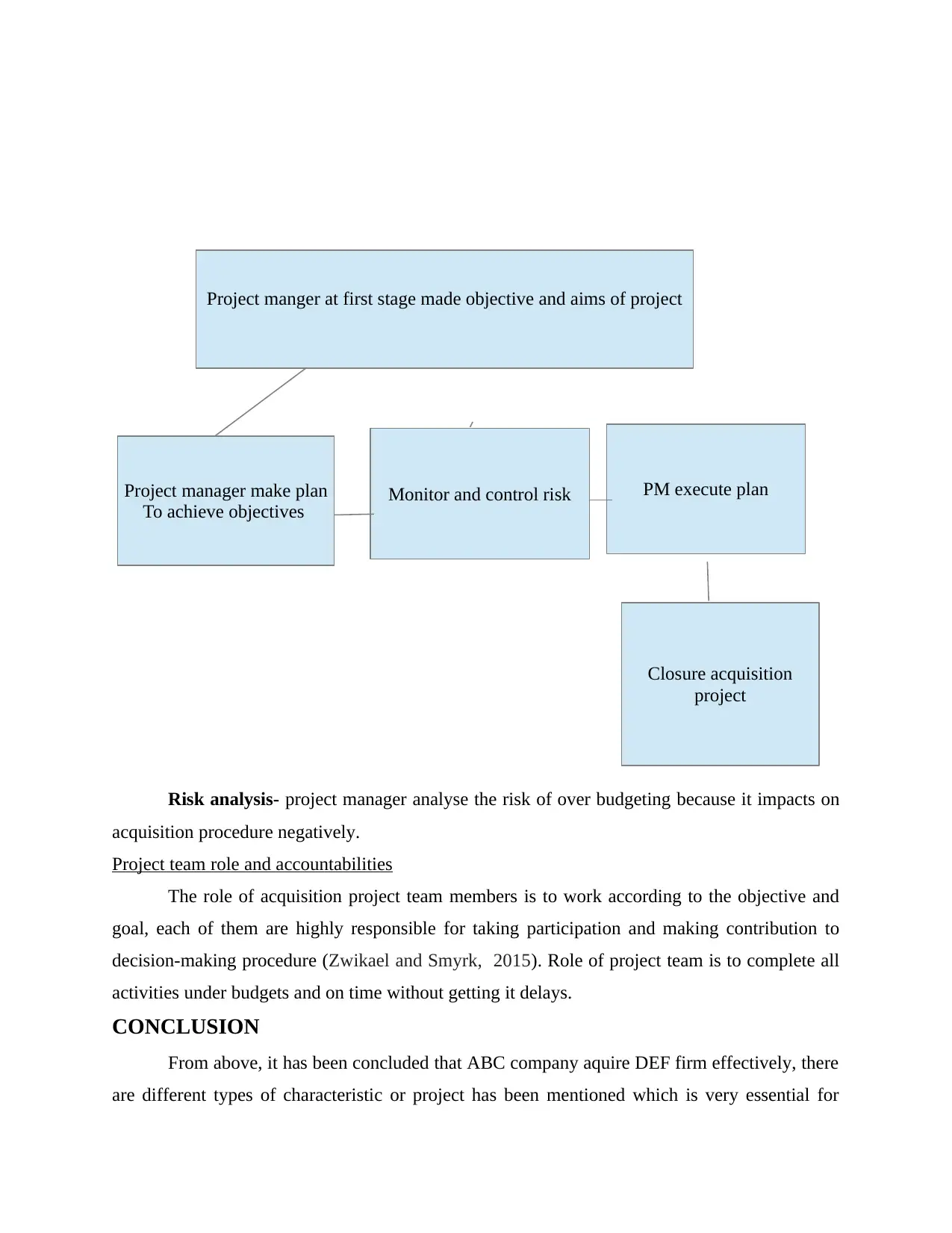
Risk analysis- project manager analyse the risk of over budgeting because it impacts on
acquisition procedure negatively.
Project team role and accountabilities
The role of acquisition project team members is to work according to the objective and
goal, each of them are highly responsible for taking participation and making contribution to
decision-making procedure (Zwikael and Smyrk, 2015). Role of project team is to complete all
activities under budgets and on time without getting it delays.
CONCLUSION
From above, it has been concluded that ABC company aquire DEF firm effectively, there
are different types of characteristic or project has been mentioned which is very essential for
Project manger at first stage made objective and aims of project
Project manager make plan
To achieve objectives
PM execute planMonitor and control risk
Closure acquisition
project
acquisition procedure negatively.
Project team role and accountabilities
The role of acquisition project team members is to work according to the objective and
goal, each of them are highly responsible for taking participation and making contribution to
decision-making procedure (Zwikael and Smyrk, 2015). Role of project team is to complete all
activities under budgets and on time without getting it delays.
CONCLUSION
From above, it has been concluded that ABC company aquire DEF firm effectively, there
are different types of characteristic or project has been mentioned which is very essential for
Project manger at first stage made objective and aims of project
Project manager make plan
To achieve objectives
PM execute planMonitor and control risk
Closure acquisition
project
Paraphrase This Document
Need a fresh take? Get an instant paraphrase of this document with our AI Paraphraser
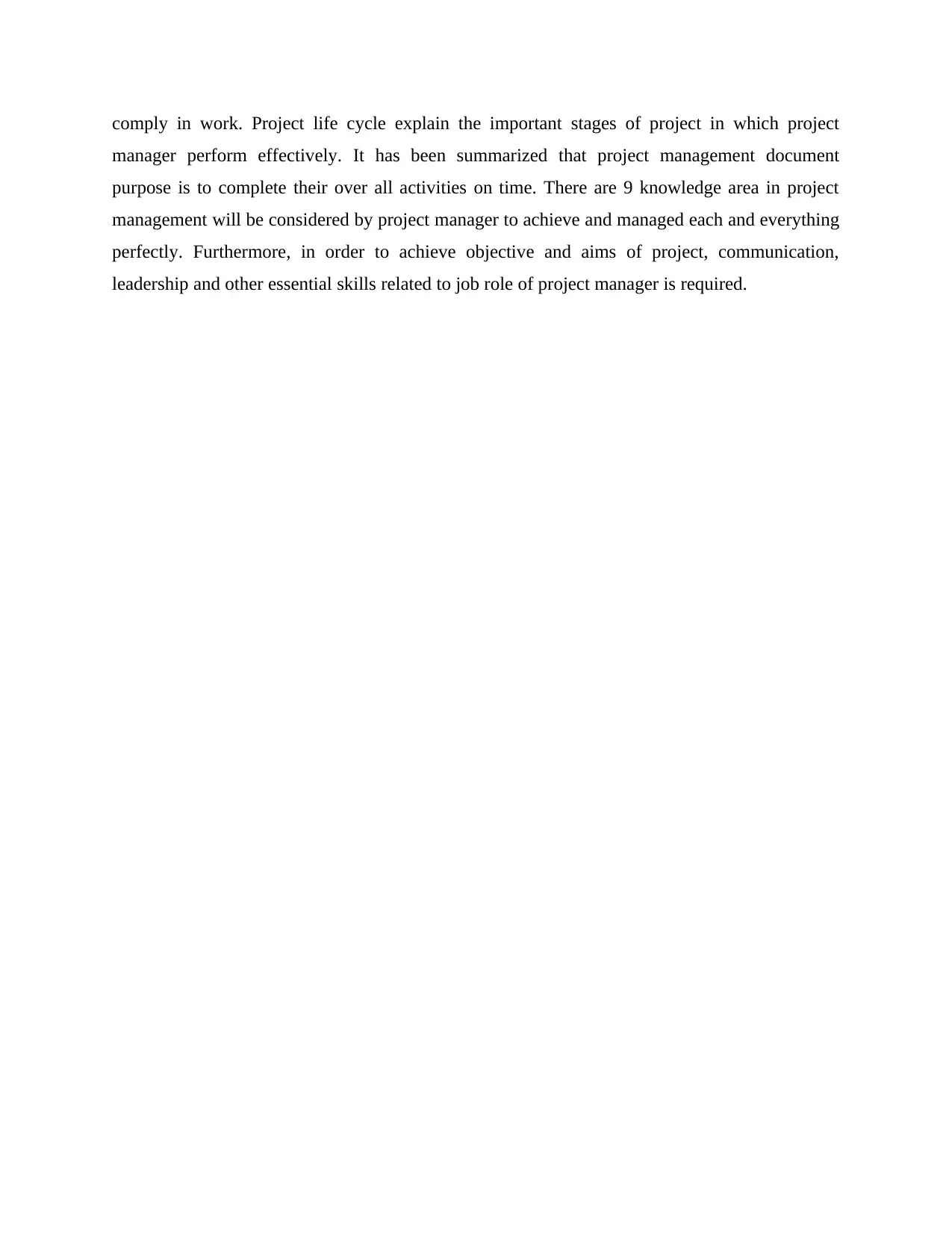
comply in work. Project life cycle explain the important stages of project in which project
manager perform effectively. It has been summarized that project management document
purpose is to complete their over all activities on time. There are 9 knowledge area in project
management will be considered by project manager to achieve and managed each and everything
perfectly. Furthermore, in order to achieve objective and aims of project, communication,
leadership and other essential skills related to job role of project manager is required.
manager perform effectively. It has been summarized that project management document
purpose is to complete their over all activities on time. There are 9 knowledge area in project
management will be considered by project manager to achieve and managed each and everything
perfectly. Furthermore, in order to achieve objective and aims of project, communication,
leadership and other essential skills related to job role of project manager is required.
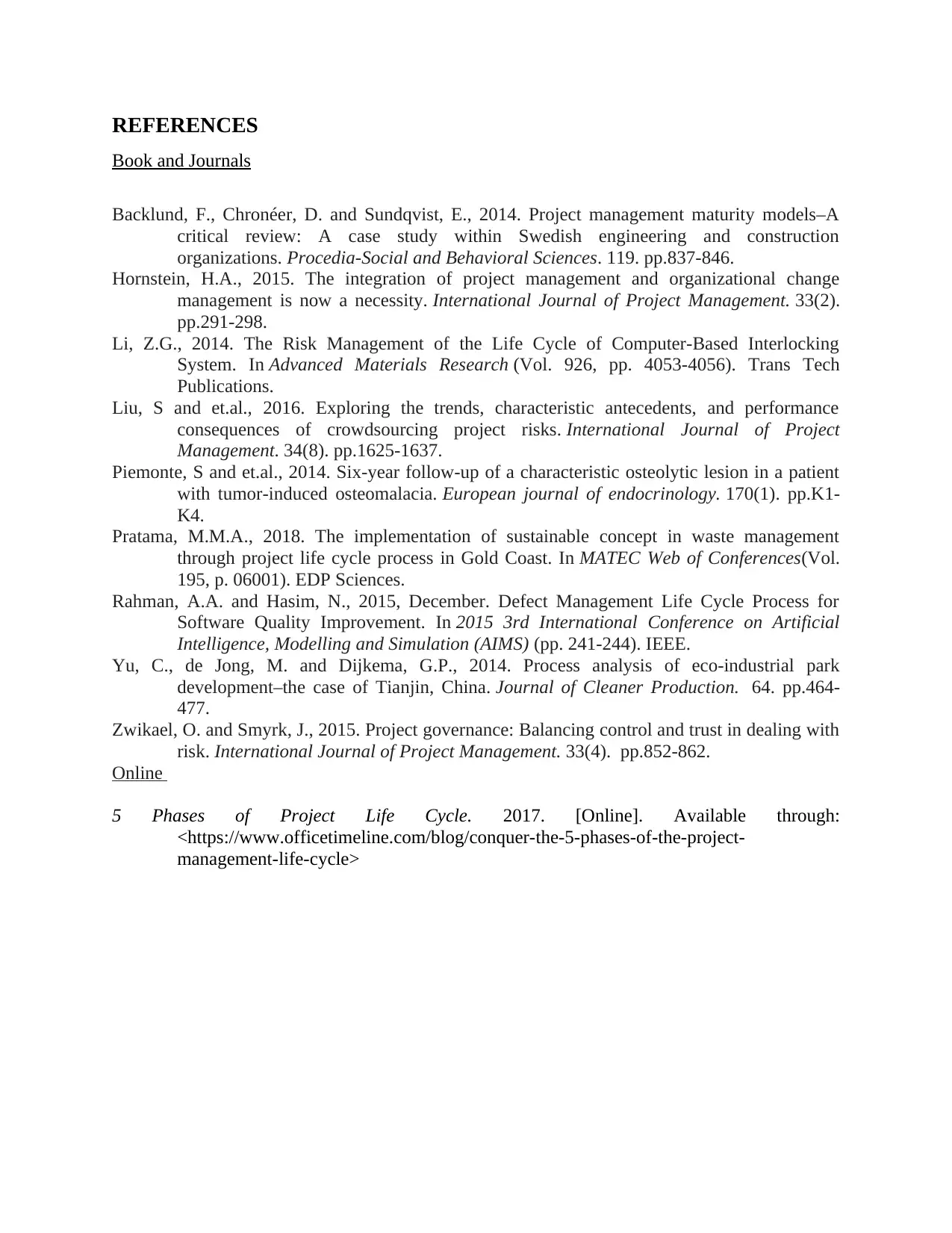
REFERENCES
Book and Journals
Backlund, F., Chronéer, D. and Sundqvist, E., 2014. Project management maturity models–A
critical review: A case study within Swedish engineering and construction
organizations. Procedia-Social and Behavioral Sciences. 119. pp.837-846.
Hornstein, H.A., 2015. The integration of project management and organizational change
management is now a necessity. International Journal of Project Management. 33(2).
pp.291-298.
Li, Z.G., 2014. The Risk Management of the Life Cycle of Computer-Based Interlocking
System. In Advanced Materials Research (Vol. 926, pp. 4053-4056). Trans Tech
Publications.
Liu, S and et.al., 2016. Exploring the trends, characteristic antecedents, and performance
consequences of crowdsourcing project risks. International Journal of Project
Management. 34(8). pp.1625-1637.
Piemonte, S and et.al., 2014. Six-year follow-up of a characteristic osteolytic lesion in a patient
with tumor-induced osteomalacia. European journal of endocrinology. 170(1). pp.K1-
K4.
Pratama, M.M.A., 2018. The implementation of sustainable concept in waste management
through project life cycle process in Gold Coast. In MATEC Web of Conferences(Vol.
195, p. 06001). EDP Sciences.
Rahman, A.A. and Hasim, N., 2015, December. Defect Management Life Cycle Process for
Software Quality Improvement. In 2015 3rd International Conference on Artificial
Intelligence, Modelling and Simulation (AIMS) (pp. 241-244). IEEE.
Yu, C., de Jong, M. and Dijkema, G.P., 2014. Process analysis of eco-industrial park
development–the case of Tianjin, China. Journal of Cleaner Production. 64. pp.464-
477.
Zwikael, O. and Smyrk, J., 2015. Project governance: Balancing control and trust in dealing with
risk. International Journal of Project Management. 33(4). pp.852-862.
Online
5 Phases of Project Life Cycle. 2017. [Online]. Available through:
<https://www.officetimeline.com/blog/conquer-the-5-phases-of-the-project-
management-life-cycle>
Book and Journals
Backlund, F., Chronéer, D. and Sundqvist, E., 2014. Project management maturity models–A
critical review: A case study within Swedish engineering and construction
organizations. Procedia-Social and Behavioral Sciences. 119. pp.837-846.
Hornstein, H.A., 2015. The integration of project management and organizational change
management is now a necessity. International Journal of Project Management. 33(2).
pp.291-298.
Li, Z.G., 2014. The Risk Management of the Life Cycle of Computer-Based Interlocking
System. In Advanced Materials Research (Vol. 926, pp. 4053-4056). Trans Tech
Publications.
Liu, S and et.al., 2016. Exploring the trends, characteristic antecedents, and performance
consequences of crowdsourcing project risks. International Journal of Project
Management. 34(8). pp.1625-1637.
Piemonte, S and et.al., 2014. Six-year follow-up of a characteristic osteolytic lesion in a patient
with tumor-induced osteomalacia. European journal of endocrinology. 170(1). pp.K1-
K4.
Pratama, M.M.A., 2018. The implementation of sustainable concept in waste management
through project life cycle process in Gold Coast. In MATEC Web of Conferences(Vol.
195, p. 06001). EDP Sciences.
Rahman, A.A. and Hasim, N., 2015, December. Defect Management Life Cycle Process for
Software Quality Improvement. In 2015 3rd International Conference on Artificial
Intelligence, Modelling and Simulation (AIMS) (pp. 241-244). IEEE.
Yu, C., de Jong, M. and Dijkema, G.P., 2014. Process analysis of eco-industrial park
development–the case of Tianjin, China. Journal of Cleaner Production. 64. pp.464-
477.
Zwikael, O. and Smyrk, J., 2015. Project governance: Balancing control and trust in dealing with
risk. International Journal of Project Management. 33(4). pp.852-862.
Online
5 Phases of Project Life Cycle. 2017. [Online]. Available through:
<https://www.officetimeline.com/blog/conquer-the-5-phases-of-the-project-
management-life-cycle>
1 out of 15
Related Documents
Your All-in-One AI-Powered Toolkit for Academic Success.
+13062052269
info@desklib.com
Available 24*7 on WhatsApp / Email
![[object Object]](/_next/static/media/star-bottom.7253800d.svg)
Unlock your academic potential
© 2024 | Zucol Services PVT LTD | All rights reserved.





